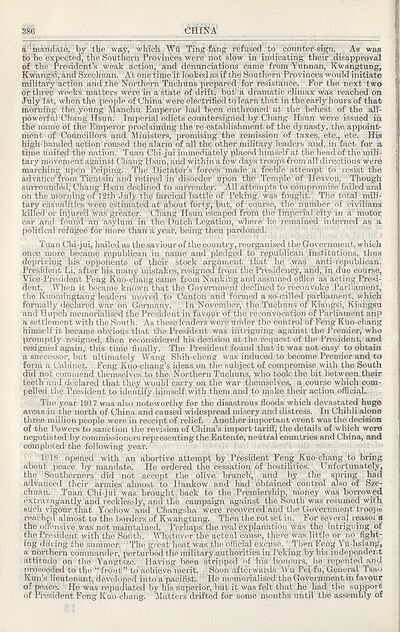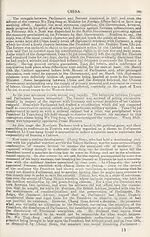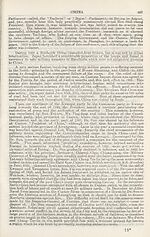1933
(444) Page 386
Download files
Complete book:
Individual page:
Thumbnail gallery: Grid view | List view

CHINA
a mandate, by the way, which Wu Ting-fang refused to counter-sign. As was
to be expected, the Southern Provinces were not slow in indicating their disapproval
of the President’s weak action, and denunciations came from Yunnan, Kwangtung,
Kwangsi, and Szechuan. At Ohe time it looked as if the Southern Provinces would initiate
military action and the Northern Tuchuns prepared for resistance. For the next two
or three weeks matters were in a state of drift, but a dramatic climax was reached on
July 1st, when the people of China were electrified to learn that in the early hours of that
morning tlie/ young Maiichu Emperor had been enthroned at the behest of the all-
powerful Chang Hsun. Imperial edicts countersigned by Chang HsUn were issued in
the name of the Emperor proclaiming the re-establishment of the dynasty, the appoint¬
ment of Councillors and Ministers, promising the remission of taxes, etc., etc. His
high-handed action roused the alarm of all the other military leaders and, in fact for a
time united the nation. Tuan Cbi-jui immediately placed himself at the head of the mili¬
tary movement against Chang Hsun, and within a few day s troops from all directions were
marching upon Peiping. The Dictator’s forces 'made a feeble attempt to resist the
advance'from Tientsin and retired in disorder upon the Temple’of Heaven. Though
surrourid4d',r Chang Hsun declined fp surrender; All attempts to compromise failed and
on the morningbrl2tb July the fhrcical battld of Peking was fotight. The total mili¬
tary casual ittes were estimated at about forty, bbt, of; course, the number of civilians
killed of injure’dYtas1 greater. Chkng Hsun escaped from the Irnperial city in a motor
car and found an asylum in the Dutch Legation, where’he remained interned as a
political refugee for more than a yeaf, being then pardoned.
Tuan CM-jui, hailed as the saviour of the country, reorganised the Government, which
once^more became republican in name and pledged to' republican insfitutions, thus
depriving his opponents of their stock argument that he was anti-republican.
President Li, after his many mistakes, resigned from the Fresideiicy, and, in due course,
Vice-President Feng Kuo-cbang came from Nankihg and assumed onice as acting Presi¬
dent. When it became known that the Government declined to reconfoke Parliament,
the Kubmingtahg1 leaders moved to Canton and formed a so-called parliament, which
formally declared war on Germany. In November, the Tuchuns of Kiangsi, Kiangsu
and Hupeh memorialised the President in favour of the reconvocation of Parliament anp
a settlement with the South. As these leaders werfeurider the control of Feng Kuo-chang
himself it became obvious that the President was intriguing against the Premier, who
promptly resigned, then reconsidered his decision at the request of the President, and
resigned again, this time finally. The President found that it was not easy to obtain
a successor, but ultimately Wang Shih-cheng w^as induced to become Premier and to
form a Cabinet. Feng Kiio-chang’s ideas on the subject of compromise with the South
did not commend themselves to the Northern Tuchuns, who took the bit between their
teeth and declared that they would carry on the war themselves, a course which com¬
pelled the President to identify himself with them and to make their action official.,
The year 1917 was also noteworthy for the disastrous floods which devastated huge
areas in the north of China and caused widespread misery and distress. In Chihli alone
three million people were in receipt of relief. Another important event was the decision
of the Powers to sanction the revision of China’s import tariff, the details of which were
negotiated by commissioners representing the Entente, neutral countries and China, and
completed the following year.
I§1‘S opened with an abortive attempt by President Feng Kuo-chang to bring
about peace by mandate. He ordered the cessation of hostilities. Unfortunately,
the Southerners did not accept the olive branch, and by the spring had
advanced their armies almost to Hankowr and had obtained' control also of Sze¬
chuan. Tuan Chi-jui was brought back to the Premiership, money was borrowed
extravagantly and recklessly, and the campaign against the South was resumed with
such vigour that Yochow and Changsha were recovered and the Government troops
reached almost to the borders of Kwangtnng. Then the,rot set in. For several reasors
the offensive was not maintained. Perhaps the real explanation-was the intriguing of
the President with theHontl]. Whatever the actual cause, thfere ivas little or no fight¬
ing dfiring the summer. The great heat was the official exciise. .ThenFehg Yu-hsiang,
a northern commander, perturbed the military authorities in Peking by his independent
attitude on the Yangtsze. Having been stripped of his horlpurs, he repented and
proceeded to the “front” to achieve merit. Sbon afterwards 'Wu Pei-fu, General Tsao
Kun’s lieutenant, developed into a pacifist. He memorialised the Government in favour
of peace. He was repudiated by his superior, but it was felt that he had the support
of President Feng Kuo-chang. Matters drifted for some months until the assembly of
a mandate, by the way, which Wu Ting-fang refused to counter-sign. As was
to be expected, the Southern Provinces were not slow in indicating their disapproval
of the President’s weak action, and denunciations came from Yunnan, Kwangtung,
Kwangsi, and Szechuan. At Ohe time it looked as if the Southern Provinces would initiate
military action and the Northern Tuchuns prepared for resistance. For the next two
or three weeks matters were in a state of drift, but a dramatic climax was reached on
July 1st, when the people of China were electrified to learn that in the early hours of that
morning tlie/ young Maiichu Emperor had been enthroned at the behest of the all-
powerful Chang Hsun. Imperial edicts countersigned by Chang HsUn were issued in
the name of the Emperor proclaiming the re-establishment of the dynasty, the appoint¬
ment of Councillors and Ministers, promising the remission of taxes, etc., etc. His
high-handed action roused the alarm of all the other military leaders and, in fact for a
time united the nation. Tuan Cbi-jui immediately placed himself at the head of the mili¬
tary movement against Chang Hsun, and within a few day s troops from all directions were
marching upon Peiping. The Dictator’s forces 'made a feeble attempt to resist the
advance'from Tientsin and retired in disorder upon the Temple’of Heaven. Though
surrourid4d',r Chang Hsun declined fp surrender; All attempts to compromise failed and
on the morningbrl2tb July the fhrcical battld of Peking was fotight. The total mili¬
tary casual ittes were estimated at about forty, bbt, of; course, the number of civilians
killed of injure’dYtas1 greater. Chkng Hsun escaped from the Irnperial city in a motor
car and found an asylum in the Dutch Legation, where’he remained interned as a
political refugee for more than a yeaf, being then pardoned.
Tuan CM-jui, hailed as the saviour of the country, reorganised the Government, which
once^more became republican in name and pledged to' republican insfitutions, thus
depriving his opponents of their stock argument that he was anti-republican.
President Li, after his many mistakes, resigned from the Fresideiicy, and, in due course,
Vice-President Feng Kuo-cbang came from Nankihg and assumed onice as acting Presi¬
dent. When it became known that the Government declined to reconfoke Parliament,
the Kubmingtahg1 leaders moved to Canton and formed a so-called parliament, which
formally declared war on Germany. In November, the Tuchuns of Kiangsi, Kiangsu
and Hupeh memorialised the President in favour of the reconvocation of Parliament anp
a settlement with the South. As these leaders werfeurider the control of Feng Kuo-chang
himself it became obvious that the President was intriguing against the Premier, who
promptly resigned, then reconsidered his decision at the request of the President, and
resigned again, this time finally. The President found that it was not easy to obtain
a successor, but ultimately Wang Shih-cheng w^as induced to become Premier and to
form a Cabinet. Feng Kiio-chang’s ideas on the subject of compromise with the South
did not commend themselves to the Northern Tuchuns, who took the bit between their
teeth and declared that they would carry on the war themselves, a course which com¬
pelled the President to identify himself with them and to make their action official.,
The year 1917 was also noteworthy for the disastrous floods which devastated huge
areas in the north of China and caused widespread misery and distress. In Chihli alone
three million people were in receipt of relief. Another important event was the decision
of the Powers to sanction the revision of China’s import tariff, the details of which were
negotiated by commissioners representing the Entente, neutral countries and China, and
completed the following year.
I§1‘S opened with an abortive attempt by President Feng Kuo-chang to bring
about peace by mandate. He ordered the cessation of hostilities. Unfortunately,
the Southerners did not accept the olive branch, and by the spring had
advanced their armies almost to Hankowr and had obtained' control also of Sze¬
chuan. Tuan Chi-jui was brought back to the Premiership, money was borrowed
extravagantly and recklessly, and the campaign against the South was resumed with
such vigour that Yochow and Changsha were recovered and the Government troops
reached almost to the borders of Kwangtnng. Then the,rot set in. For several reasors
the offensive was not maintained. Perhaps the real explanation-was the intriguing of
the President with theHontl]. Whatever the actual cause, thfere ivas little or no fight¬
ing dfiring the summer. The great heat was the official exciise. .ThenFehg Yu-hsiang,
a northern commander, perturbed the military authorities in Peking by his independent
attitude on the Yangtsze. Having been stripped of his horlpurs, he repented and
proceeded to the “front” to achieve merit. Sbon afterwards 'Wu Pei-fu, General Tsao
Kun’s lieutenant, developed into a pacifist. He memorialised the Government in favour
of peace. He was repudiated by his superior, but it was felt that he had the support
of President Feng Kuo-chang. Matters drifted for some months until the assembly of
Set display mode to:
![]() Universal Viewer |
Universal Viewer | ![]() Mirador |
Large image | Transcription
Mirador |
Large image | Transcription
Images and transcriptions on this page, including medium image downloads, may be used under the Creative Commons Attribution 4.0 International Licence unless otherwise stated. ![]()
| Asian directories and chronicles > 1933 > (444) Page 386 |
|---|
| Permanent URL | https://digital.nls.uk/203680083 |
|---|
| Attribution and copyright: |
|
|---|---|
| Description | Volumes from the Asian 'Directory and Chronicle' series covering 1917-1941, but missing 1919 and 1923. Compiled annually from a multiplicity of local sources and research. They provide listings of each country's active corporations, foreign residents and government agencies of all nationalities for that year, together with their addresses. Content includes: various treaties; coverage of conflicts; currencies and taxes; consular fees; weights and measures; public holidays; festivals and traditions. A source of information for both Western states and communities of foreigners living in Asia. Published by Hongkong Daily Press. |
|---|---|
| Shelfmark | H3.86.1303 |
| Additional NLS resources: |

